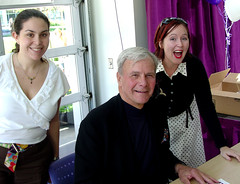Web+10+1...
What ever happened to the manifesto?
Clyde
This blog was created as an assignment for Poynter's "Web + 10: The Future of Online Journalism" seminar
 NOTE: I initially posted this yesterday afternoon in my Yahoo! 360 Degrees blog (if you would like an invite to 360 Degrees, email me), and it received over 10 interesting, insightful comments, so I figured I would open it up to our discussion group and the wider Internet audience, by re-posting it here.
NOTE: I initially posted this yesterday afternoon in my Yahoo! 360 Degrees blog (if you would like an invite to 360 Degrees, email me), and it received over 10 interesting, insightful comments, so I figured I would open it up to our discussion group and the wider Internet audience, by re-posting it here.Like almost all enwsmagazing programs, the "investigative reporting" leaned toward hidden cameras catching babysitters and nannies hitting children in their care and exposing local hotel chains that didn't properly clean the rooms. These may be actually be important topics that people do care about, but they weren't the types of issues I personally to which I wanted to devote my career and my life. (Here is the tongue-in-cheek account I wrote about my internship with Diane Sawyer at ABC that was published in the campus newpaper when I was a senior at Vassar.
Serendipitously, I became obsessed with the Internet around this same time. While I was Editor-in-Chief of Vassar's school paper ("The Miscellany News"), we brought the publication online. In 1994, I also had the good fortune of taking a class called "Hypertext Rhetoric and Poetics" with Michael Joyce, author of one of the first "hypertext novels" called "Afternoon." Hypertext as a freestanding form of organizing words and information, and later as the building blocks for the Internet excited me -- its power to enable writers to tell stories in new ways really inspired me. In 1993 I wrote a (somewhat-clumsy-sounding-to-2005-ears) article for Vassar's newspaper about how hypertext was empowering female writers in new ways.
I truly believe in the power of blogging and online journalism to improve our abilities to share stories accurately and compellingly. I think some of this is already being done. The topic-oriented pages created by the Yahoo! Full Coverage team are a great example. They provide a rich context to help readers get a 360-degree understanding of major events from a variety of different perspectives and sources. Blogging -- though it is lately criticized for often being politically polarizing -- also gives individuals and citizen journalist the power to report events and share them with thousands and hundreds of thousands of people. It's incredibly empowering.
Still, I have tremendous respect and awe for these men of broadcast journalism and their ability to report the stories of the world for the past 20-30 years.
If you're interested in this topic, be sure to read this LA Weekly interview with Nightline executive producer Leroy Sievers about "the death of serious news." My friend Josho sent me that one, and it supplies some interesting details on the state TV network news from an insider.
As a final aside -- the photo at the top of this post is of my friend Laura who works on the Yahoo! Full Coverage team and me with Tom Brokaw. The photo was taken by Yahoo! founder Jerry Yang with my Sony Mavica camera. Laura and I said, "Jerry, can you please take our photo with Tom?" And Jerry said, "OK, but you have to promise you won't sell it on eBay."
That's a promise! I just wanted it for my blog, of course. And for the memories.
What do YOU think about all this? Do you think that TV broadcast journalism is dying/changing/irrelevant? What do you think the role is or should be for bloggers or citizen journalists? Do you consume all or most of your news online? via newspapers? or via TV? Please share. I'm curious.
ABC News details a bit about how Pope John Paul II used his media-savvy to become a global superstar. (He released a music video, featuring him singing and reciting psalms and the Gospels. He also recorded the rosary.) It's also interesting to note that he became pope in 1978, the same year that instant global television became available.
I agree with Scott Rosenberg's assessment that to ask "Are bloggers journalists?" is like asking "Are telephone callers journalists?" or "Are typewriter users journalists?" or "Are mimeograph operators journalists?" or "Are writers journalists?" (As Rosenberg eloquently concludes, "Well, duh, sometimes! But sometimes not.")
I agree with Scott Rosenberg's assessment that to ask "Are bloggers journalists?" is like asking "Are telephone callers journalists?" or "Are typewriter users journalists?" or "Are mimeograph operators journalists?" or "Are writers journalists?" (As Rosenberg eloquently concludes, "Well, duh, sometimes! But sometimes not.")
I enjoyed Josh Levin's piece on Rappers and Bloggers in Slate last week. Did anyone else read it? What did you think?
"We need to preface this all by saying that we all believe in basic journalistic standards."
-- Ron James (managing online editor, SignOnSanDiego.com)
"My RSS reader *is* my filter."
We must provide utility -- our content must:
"I never went to journalism school -- I learned from osmosis. You learn the value of telling the truth."
We must maintain and expand the role of the journalist:
"Can journalists become smart mobloggers?"
We must acknowledge citizen journalists:
"We have no idea how they are really going to acccess us in five years." -- Jessica Barron, senior editor, Yahoo! Inc.
We must be flexible: